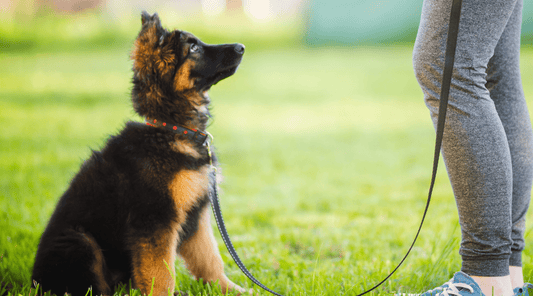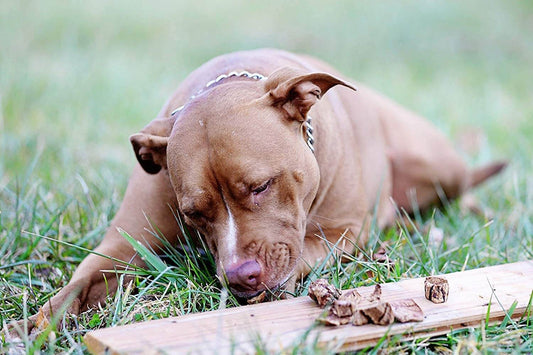Bone of Contention: The Link Between Dog Chews and Diarrhea
Dawn Miller Jul 03, 20245 Minute ReadWalking through the charming streets of my neighborhood with my furry companions leading the way, I often reflect on the simple joys in life—hiking, painting, and growing some of my own food.
My three dogs—each with their own quirky personalities and boundless energy—have become my kids since the last human one left for college last year.
As much as I love our walks, there's one thing I don't love. That's dog diarrhea. There, I said it.
Recently while on one of these strolls, the unthinkable happened. I realized something wasn't right with Bruno, our lab mix. He was dragging his leash just ahead, tail high, sniffing every patch of grass like he was searching for treasure. He didn't look okay. And then he stopped. It happened. A choice word came out of my mouth. I don't have small kids around anymore, after all.
I hate to see my big boy suffer almost as much as I didn't want to try to clean up my dog's poop that day like a good dog mama should. So, I began to think back on what might have caused this.
Was it the bones and chews I've been giving him every day? I began looking into it, and here's what I found out.
What Causes Diarrhea in Dogs?

Diarrhea in dogs can be caused by various factors like:
- Eating spoiled food or garbage
- Eating poop. Hey, we all know some dogs do it. (Not mine, of course.) 😉
- Infections
- Parasites
- Stress
- Raw-hide dog treats
- Underlying health issues like allergies, liver disease, or pancreatitis
- Sudden change in diet
On that last one, I discovered that even switching from kibble to whole-food dog food can do it. Unknown ingredients shock the gut microbiome, which needs time to adjust.
As someone who prioritizes health and natural living for myself, I care about what Bruno and my other fur-babies eat—only real food for them.
When I investigated, I learned that even real whole foods can cause issues in dogs when eaten to excess. That includes dog bones.
Why Does My Dog Get Diarrhea After Eating Bones?
Dogs can get dog diarrhea after eating bones because some bones aren't properly cooked. They can splinter and cause lacerations in the digestive tract. Or smaller pieces can get lodged, causing blockages.
Your dog's body responds by pulling as much liquid into the intestines as possible to flush it out before it can do more damage. All that water comes on in your dog's poop.
Raw bones are also a problem because they carry pathogens.
But splintering causing diarrhea isn't super common—unless you're buying really cheap bones or giving your dog your bone broth bones after they've been roasted and simmered all day.
This is one of the many reasons I avoid soup bones and instead stick with slow-smoked, grass-fed options that are dense, durable, and properly processed for safety—like the Meaty Champ Bone from K9 Connoisseur.
Pancreatic inflammation is much more common.
Pancreatitis in Dogs
The more common cause of stomach upset in dogs is the fat content in bones.
Now, if there's one thing we've learned since the '90s: "fat is the enemy" craze, it's that all fat isn't bad. You and your dog need fat for good health. But too much of anything is bad.
Signs of Dog Pancreatitis
According to experts, pancreatitis can vary in severity. Mild inflammation may cause occasional diarrhea or tiredness. In severe cases, vomiting, abdominal pain, dehydration, and weakness can occur. You should call your vet immediately if you're seeing severe pancreatitis symptoms.
That said, pancreatitis is unlikely when bones are not given in excess.
So, I Have a Few 3 Top Recommendations for You:

Choose the Right Bones
For me, it's got to be an all-natural dog bone. I don't eat fake food and wouldn't give it to my babies. I like the dog bones and training treats from K9 Connoisseur. These are long-lasting dog bones, even for an aggressive chewer. Sometimes, I buy Dynamo Bone Chew Treats for our bull terrier. She's an aggressive chewer but needs a smaller bone than Bruno.
Moderate Chew Time
I limit bone treats to a couple of times a week and use other treats for training.
Observe Your Dog
Monitoring my dogs after giving them bones helps me catch any signs of distress early.
Do Marrow Bones Give Dogs Diarrhea?
They can if your dog consumes too much at one time. Ideally, you should only give your dog their marrow bone 2-3 times a week for around 10-20 minutes.
This moderation also allows them to savor it and get the health benefits for longer.
And remember what I said about changing up your dog's diet. I always monitor my furry kids closely when I give them any new chews, even the best dog chews for large dogs out there.
If they have a bad reaction, I may need to limit their time at first to let their digestive system adjust.
Can My Dog Eat Bones?
Marrow bones for dogs are great for my dog's health. They contain lots of collagen for healthy bones, skin, hair, and joints. Collagen is also a protein, so marrow bones are a high-protein treat.
Dog bones are also good for dental health. They help Bruno clean his teeth, so I don't have to between vet cleanings.
But as I always say, "safety first". Are dog bones safe for dogs? That depends.
Bones from poultry are never safe because they shatter. They're not the best dog chew bones.
Can You Give Beef Bones to Dogs?
Beef bones are the very best because they're large and solid without being so hard that they damage teeth.
You don't want bones that have been cooked for too long or at a high temperature. This can also cause even beef bones to splinter.
I like to get grass-fed cow bones for good measure because I know that grain-fed cows eat an unnatural diet that can lead to all kinds of sickness. I don't think bones from grain-fed cattle are as nutritious.
What Are The Best Dog Bones For Aggressive Chewers?
The best bones for aggressive chewers must be durable and safe. They should be large enough that your dog can't swallow them, and they shouldn't splinter. They come from USA-based cattle ranchers, so you know the source.
For my Bruno, I get these Marrow Filled Champ Bones.
How Long Can a Dog Chew on a Bone?
Your dog can safely chew on a bone for 10 to 20 minutes. It's important that you stay near them during this time, just in case. You should also take the bone away if it becomes small enough to swallow.

For my Bruno, I get Lilly's Mammoth Marrow Filled Bones.
Why Does My Dog Eat Poop?
Dogs may eat poop because of nutritional deficiencies, to get attention, or underlying health issues. Some like the taste. It can also be a learned behavior from their mother during puppyhood.
Dogs eating poop is a concern, especially if they eat other's dog's or cat's poop. That poop may contain parasites, which can lead to diarrhea. For this reason, it's important to speak with your vet about possible deficiencies. Once you've verified that it's not a health issue, you can get the best dog bones to train your dog not to do this.
Is My Dog's Poop Normal?
Normal dog poop should be firm, segmented, and brown. When I notice consistency changes (such as diarrhea), color (like black, red, or white), or if there's mucus or blood, I usually call their vet.
Final Thoughts from a Dog Mama
Through this journey, I've realized that my role as a pet parent involves more than just providing love and shelter. It's about making informed decisions. As I continue to nurture my garden and paint my canvases, the health and happiness of my dogs remain my top priority. Ensuring they live a joyous, healthy life is, after all, the best treat I can offer.
Available On:
Disclosure: This article may contain affiliate links, which means we may earn a small commission if you make a purchase through these links—at no extra cost to you. We only recommend products we trust and believe will benefit you and your K9.






